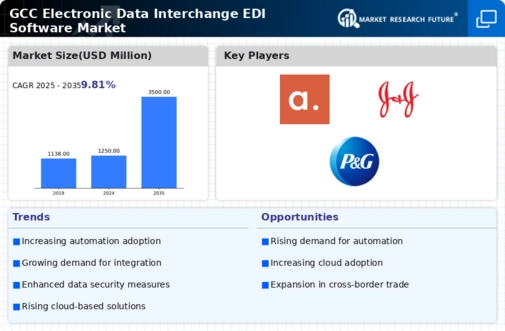Rising E-Commerce Activities
The GCC electronic data interchange software market is experiencing a significant boost due to the rising e-commerce activities in the region. With the rapid growth of online shopping platforms, businesses are increasingly relying on EDI solutions to manage their transactions efficiently. The e-commerce sector in the GCC is projected to reach USD 28 billion by 2026, creating a substantial demand for effective data exchange systems. EDI software enables seamless communication between retailers, suppliers, and logistics providers, ensuring timely order fulfillment and inventory management. As e-commerce continues to expand, the need for reliable EDI solutions that can handle high transaction volumes is likely to drive further investments in the GCC electronic data interchange software market.
Focus on Supply Chain Optimization
The GCC electronic data interchange software market is significantly driven by the focus on supply chain optimization among businesses. Organizations are increasingly recognizing the importance of efficient supply chain management in enhancing competitiveness and reducing operational costs. EDI solutions play a crucial role in streamlining supply chain processes by facilitating real-time data exchange between trading partners. Recent studies indicate that companies utilizing EDI systems can reduce order processing times by up to 50%, thereby improving overall efficiency. As businesses strive to optimize their supply chains, the demand for advanced EDI solutions that offer integration capabilities and analytics is likely to grow. This trend underscores the pivotal role of EDI in the GCC electronic data interchange software market.
Integration of Advanced Technologies
The GCC electronic data interchange software market is poised for transformation through the integration of advanced technologies such as artificial intelligence and machine learning. These technologies are enhancing the capabilities of EDI systems, enabling businesses to automate processes and improve data accuracy. For example, AI-driven analytics can provide insights into supply chain inefficiencies, allowing organizations to optimize their operations. The market is projected to grow by 30% over the next five years, driven by the increasing adoption of these technologies. Companies are seeking EDI solutions that not only facilitate data exchange but also leverage advanced analytics for strategic decision-making. This trend indicates a shift towards more intelligent EDI systems that can adapt to changing business environments, thereby fostering growth in the GCC electronic data interchange software market.
Regulatory Compliance and Standardization
The GCC electronic data interchange software market is significantly influenced by the increasing emphasis on regulatory compliance and standardization. Governments in the region are implementing stringent regulations to ensure data security and privacy, which necessitates the adoption of compliant EDI solutions. For instance, the introduction of the UAE's Data Protection Law has prompted businesses to reassess their data handling practices. This regulatory landscape is compelling organizations to invest in EDI software that not only meets compliance requirements but also aligns with international standards. As a result, the market is witnessing a shift towards solutions that offer robust security features and facilitate adherence to regulatory mandates. The potential for non-compliance penalties further incentivizes businesses to adopt reliable EDI systems, thereby driving growth in the GCC electronic data interchange software market.
Growing Demand for Real-Time Data Exchange
The GCC electronic data interchange software market is experiencing a notable surge in demand for real-time data exchange solutions. Businesses across various sectors, including retail, logistics, and manufacturing, are increasingly recognizing the necessity of instantaneous data sharing to enhance operational efficiency. This trend is driven by the need for timely decision-making and improved customer service. According to recent statistics, the GCC region has seen a 25% increase in the adoption of EDI solutions over the past year, indicating a robust market growth trajectory. Companies are now prioritizing EDI systems that facilitate seamless integration with existing platforms, thereby streamlining their supply chain processes. As organizations strive to remain competitive, the emphasis on real-time data exchange is likely to propel further investments in the GCC electronic data interchange software market.













